B.Sc NURSING PROGRAM
I.OVERVIEWOFTHEPROGRAM
The B.Sc. nursing degree program is a four-year fulltime program comprising eight semesters, which prepares a student to become a registered nurse qualified to practice in a variety of settings in either public/ government or private health care settings. It adopts credit system and semester system as per UGC guidelines.
The program prepares nurses for generalist nursing practice. Knowledge acquisition related to wellness, health promotion, illness, disease management and care of the dying is core to nursing practice. Mastery of competencies is the main focus. Students are provided with opportunities to learn a whole range of nursing skills in addition to acquiring knowledge related to nursing practice. This is achieved through learning in skill lab/simulated labs and clinical environment. Simulation will be integrated throughout the curriculum wherever feasible to enable them to develop competencies before entry into real field of nursing practice.
II. PHILOSOPHY
Health is a state of well-being that encompasses physical, psychological, social, economic and spiritual dimensions. Wellness is the individual’s perception of wellness and is influenced by the presence of disease and individual’s ability to adapt. Health is a right of all people. Individuals have a right to be active participants in achieving health as they perceive it. Society consists of dynamic and interactive systems involving individuals, families, groups and communities. Cultural diversity, race, caste, creed, socio economic levels, religion, lifestyles, changes in environment and political factors influence it. Nurses recognize and respect human differences and diversity of population within society and provide ethical care with respect and dignity and protect the irrigates.
Nursing as a profession and a discipline utilizes knowledge derived from arts, sciences(physical, biological and behavioral),humanities and human experience. Nursing science incorporates clinical competence, critical thinking, communication, teaching learning, professionalism, and caring and cultural competency. Nurse collaborate with other health disciplines to solve individual and community health problems. Nursing facilitates evidence-based practice, compassionate caring among its practitioners in response to emerging issues in health care and new discoveries
The faculty has the responsibility to be role models and create learning environment that facilitates cultivation of critical thinking, curiosity, creativity and inquiry driven self- directed learning and attitude of life-long learning in students. Learners and educators interact in a process whereby students gain competencies required to function within their scope of practice.
III. AIMS
Produce knowledgeable competent nurses with clear critical thinking skills who are caring, motivated, assertive and well-disciplined responding to the changing needs of profession, health care delivery system and society.
Prepare graduates to assume responsibilities as professional, competent nurses and midwives in providing promotive, preventive, curative and rehabilitative health care services in settings.
Prepare nurses who can make independent decisions in nursing situations within the scope of practice, protect the rights of individuals and groups and conduct research in the areas of nursing practice and apply evidence-based practice.
Prepare nurses to assume role of practitioner, teacher, supervisor and manager in clinical or public health settings.
IV.CORE COMPETENCIES FOR NURSING PRACTICE BY B.SC. GRADUATE
The B.Sc. Graduate nurse will be able to:
1. Patient centered care
Provide holistic care recognizing individual patient’s preferences, values and needs, that is compassionate, coordinated, age and culturally appropriate safe and effective care.
2. Professionalism
Demonstrate accountability for the delivery of standard-based nursing care as per INC standards that is consistent with moral, altruistic, legal, ethical, regulatory and human is safety .
3. Leadership
Influence the behavior of individuals and groups within their environment and facilitate establishment of shared goals.
4. System-based practice
Demonstrate awareness and responsiveness to the context of health care system and ability to manage resources essential to provide optimal quality of care.
5. Health informatics and Technology
Use technology and synthesize information and collaborate to make critical decisions that optimize patient outcomes.
6. Communication
Interact effectively with patients, families and colleagues fostering mutual respect and shared decision making to enhance patient satisfaction and health out comes.
7. Team work and Collaboration
Function effectively within nursing and interdisciplinary teams, fostering open communication, mutual respect, shared decision making, team learning and development.
8. Safety
Minimize risk of harm to patients and providers through both system effective ness and individual performance.
9. Quality improvement
Use data to monitor the out comes of care processes and utilize improvement methods to design and test changes to continuously improve the quality and safety of health care system.
10. Evidence based practice
Identify, evaluate and use the best current evidence coupled with clinical expertise and consideration of patient’s preferences, experience and values to make practical decisions.t
©2023| Powered By Maa Sharda Nursing & Paramedical College
